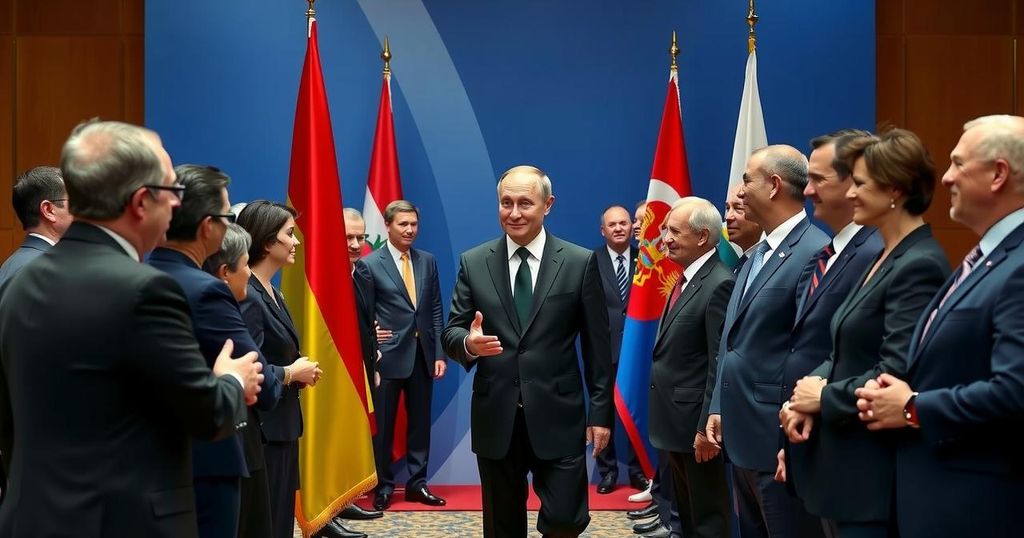Putin Hosts Global Leaders at BRICS Summit Amid International Isolation
At the recent BRICS summit, Russian President Vladimir Putin hosted 36 world leaders, aiming to project Russia’s importance despite Western ostracism. The summit fostered discussions on economic cooperation and countering US dollar dominance, while highlighting the ideological divisions within BRICS. The outcomes may significantly impact perceptions of Russia in international relations and the ongoing Ukraine conflict.
Russian President Vladimir Putin welcomed 36 world leaders, including prominent figures from China, India, and Iran, at the recent BRICS summit, signaling an attempt to demonstrate that Moscow remains influential on the global stage despite being ostracized by the West and facing an arrest warrant from the International Criminal Court (ICC). The summit, the largest international gathering hosted by Putin since the onset of the Ukraine conflict, featured key bilateral discussions, notably with Chinese President Xi Jinping and Indian Prime Minister Narendra Modi. The participation of these leaders, along with representatives from various countries such as Algeria, Azerbaijan, and Indonesia, underscores an overarching goal of BRICS to counterbalance Western economic dominance, particularly the influence of the US dollar. Iranian President Masoud Pezeshkian expressed this sentiment, stating, “BRICS can be a way out of American totalitarianism and create a path of multilateralism. BRICS can be a solution to deal with the dominance of the dollar and deal with the economic sanctions of countries.” However, the expansion of BRICS poses potential challenges concerning ideological unity, as member states such as India and Brazil seek cooperation without aligning fully with the anti-Western rhetoric prevalent among other members like Russia and China. Despite this apparent discord, experts, such as Alex Gabuev from the Carnegie Russia Eurasia Center, assert that the summit serves to bolster Putin’s international image, suggesting that the gathering effectively counteracts perceptions of Russia as an international pariah. The outcome of this summit may also have implications for the ongoing conflict in Ukraine, which remains a pivotal issue in international relations. Although the participation of UN Secretary-General António Guterres remains uncertain, his presence could signify broader international acceptance of the summit’s proceedings.
The BRICS summit represents a significant diplomatic event where Russia, alongside other BRICS nations, aims to solidify a coalition that challenges Western hegemony in global affairs. Established initially as an economic bloc, BRICS has expanded its membership beyond the original five members—Brazil, Russia, India, China, and South Africa—to include countries like Egypt and Argentina, projecting a collective voice against the dominance of Western economies. The ongoing geopolitical tensions, particularly surrounding the Ukraine conflict, frame the context for this summit, with many nations attempting to navigate their positions between the West and Russia.
In conclusion, the BRICS summit serves as a crucial platform for Russia to showcase its continued relevance on the world stage, despite the isolation imposed by the West. The meeting not only emphasizes the collective interests of the member countries in promoting a multipolar world order but also highlights the complexities of maintaining unity amidst diverging national interests. As global dynamics evolve, the efficacy of BRICS in effectively countering Western economic policies will determine its future influence.
Original Source: www.theguardian.com




Post Comment